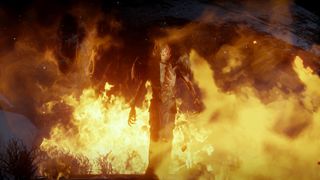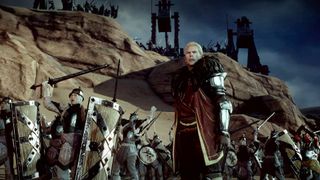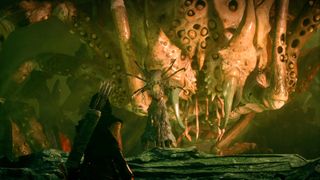The making of Dragon Age: Inquisition
How Bioware build RPGs.

"One of the things I had as a goal for the game is that we had at least a few really big moments were you were like 'oh, wow—my previous games really did make a difference'. In terms of the combinatorial explosion of having three characters talking to a character who might have three personalities, who might be male or female, who might be one of three different classes—it was challenging, but it was the fun kind of challenge. How many times do you get to have a protagonist from a previous game show up? We’d never done it before."
In this instance, dealing with the complexity was worth it because it capitalised on something that only BioWare can really offer. I asked Laidlaw if they were tempted to take it further—to include other well-known Grey Wardens like Hawke's siblings Carver and Bethany, Anders, or, the real elephant in the room, the player's own Warden Commander from Dragon Age: Origins.
The Warden introduces an enormous complication.
"We considered all of those," he says. "The Warden introduces an enormous complication. The thing that I was personally really leery to do was force a voice onto a non-voiced character. A lot of people really wanted the Warden and I understand that. The problem is that this is such a personal attachment that I was not confident we could do it to the point where it would have that universal appeal. I feel like there's a sort of respect to saying 'no, your character is too special to appear here'. The disappointment of the Warden not being there is more palatable than the Warden being there and not being right."
It's a double bind that encapsulates the effect BioWare has on its most hardcore fans: Origins gave the player so many tools to create a character that they imaginatively invested in that said character, despite their supreme importance, has become too important to include in the series.

The team is also motivated by a desire to keep things moving and changing. This is the reason for Inquisition’s post-credits twist—the moment when the companion Solas is revealed to be the lost elven trickster god Fen'Harel, the Dread Wolf. It's a left-field reveal, something that will only mean something to people who have been reading a lot of codex entries over the course of three games, and the "death" of Flemeth in that scene functionally closes off a mystery that has been lingering over the series since Origins. Laidlaw calls it their "Marvel tease", and compares it to the glimpse of Thanos at the end of the Avengers movie—a gesture forward that is not intended to be entirely understood right away.
"I look at that as more of a forward looking opportunity that adds a wrinkle to the world," Laidlaw says. "What it replaces is the 'what's up with Flemeth' mystery, that being a fundamental question that everybody was clamouring for us to resolve. I'll tell you how that part works, but then I'm going to introduce a new mystery because I don't want the line to die.
"What it says is 'more’s to come' in a slightly less explicit way than '007 will return'," he continues. "It also says 'hey, are you interested in this? There's a lot of Dragon Age stuff out there, and there are a lot of people who would be happy to help you out'. In a way, it builds community."
The biggest gaming news, reviews and hardware deals
Keep up to date with the most important stories and the best deals, as picked by the PC Gamer team.

In that sense, the Solas reveal starts the cycle over. If BioWare's style is defined by its uncommon willingness to invest serious time and effort into granting the player large amounts of creative agency over the course of multiple games, then there need to be points where new players—those who haven't been playing these games since 2009—have a chance to join as equals. Fan service has a responsibility to create new fans.
Another fundamental part of the equation is that the BioWare team are part of that same community of fans that Laidlaw describes. "The other big goal with that reveal," he says, "and maybe this is just us having a bit of fun, is that the whole writing and art team spent the entire game knowing that it was coming. We spent the entire time thinking 'what can we do with this, how can we seed this.' Solas was written by Patrick who just had the best time putting in all these sneaky little references." They're there, too, if you go looking from them—from Solas's mural in Skyhold to the wolf statues found more or less everywhere you go.
The reason nobody else makes BioWare RPGs is, I suspect, because no other studio combines these elements in quite this way—a communal investment in each fictional universe that extends to the players who play the game, a sense of collective responsibility for the player's experience that binds game systems and social issues, a love of character, and a willingness to invest deep in solving complex multiple-path narrative problems just because they can. It's not one trick; it's many, and collectively they amount to a "feel" of roleplaying game that doesn't exist anywhere else.
Joining in 2011, Chris made his start with PC Gamer turning beautiful trees into magazines, first as a writer and later as deputy editor. Once PCG's reluctant MMO champion , his discovery of Dota 2 in 2012 led him to much darker, stranger places. In 2015, Chris became the editor of PC Gamer Pro, overseeing our online coverage of competitive gaming and esports. He left in 2017, and can be now found making games and recording the Crate & Crowbar podcast.
Most Popular


